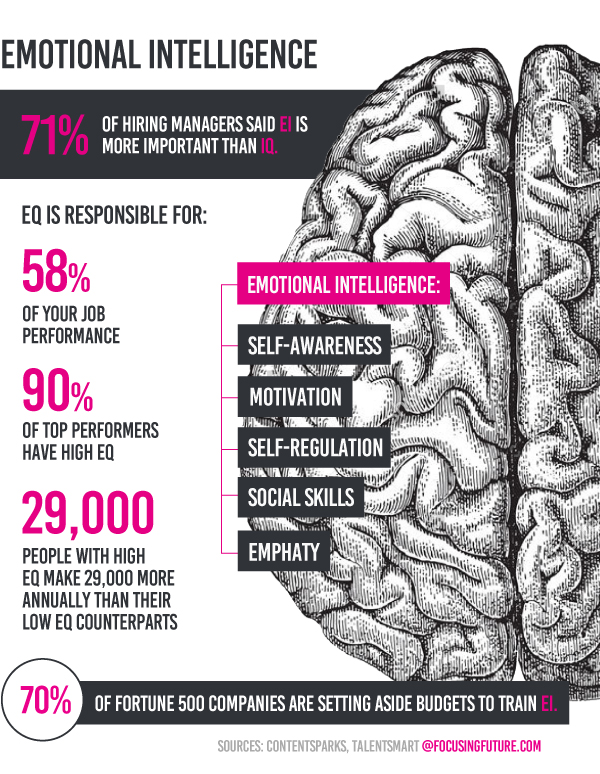![]() 5 minute read
5 minute read
Emotional intelligence has proven itself today to be an important part of the business model. The ‘human’ touch makes leaders better managers, employees productive and technology more relatable.
The need to be
Emotionally Intelligent
Human interaction is a combination of reason, thought, and emotions. While the IQ benchmark caters to the first two, emotional intelligence (EI) was often not given its due importance. However, this is changing. EI, which is described by Oxford dictionary as ‘the capacity to be aware of, control, and express one’s emotions, and to handle interpersonal relationships judiciously and empathetically,’ is now being valued by businesses. Recent workspace analytics have suggested its importance in numerous surveys. TalentSmart in a recent study to determine predictors of growth attributed 58% success rate in all jobs to those who were emotionally intelligent. Similarly, Levo Institute polled millennials on the key elements of career development, and 80% of the respondents indicated EI as important while 87% termed their leaders’ EI to their motivation at work. A survey by CareerBuilder found that 71% of 2662 U.S. hiring managers interviewed chose emotionally intelligent candidates over those with higher IQ when hiring. Tim Leberecht, the author of[nbsp]The Business Romantic, explains this preference in these words: “Ironically, as process-driven, linear work gets automated, more subjective tasks that require empathy, imagination and a nuanced understanding of meaning will become the stronghold of those with a broader, generalist skill set.”
A path to being
a better leader
Some of the biggest firms in the world now include EI in their training programs. According to a study done of leaders from prominent Fortune 500 companies, EI was found to be an incredibly valuable asset for leadership. BMW, Boeing, Kodak, FedEx, and Shell have used EI in management training. Hilton employed it in its customer service leadership training. PepsiCo used it as a criterion to select its executives. In other words, business has found investments in EI very fruitful and intend to continue such programs. Studies have shown that well-developed programs can improve interpersonal skills, stress management and overall productivity of employees even beyond the workplace. Sanofi-Aventis, the 4th largest pharmaceutical company in the world, engaged in an EI training in Australia and estimated an almost $6 return for every $1 they invested in the training.

Individual statistics for
an emotionally healthy environment
Besides offering formal training to employees, the employers can make use of individual data statistics to reorient their strategies. Wearable technology today has become a norm and are especially employed in the fitness arena. However, the statistics recorded have interpretations beyond physical health. With calculations of heart rate, skin temperature, and brain waves, the data can paint a clear picture of the wearer’s emotional health, their mood, and subsequent productivity patterns. By understanding these conditions, managers are in a better place to lead their teams and make changes that can make their employees most efficient. This can include modified shift scheduling, synchronized team building and better sourcing of tasks and commitments. All of this can be shaped to enhance and train the level of EI of the employees. Accenture Institute for High Performance and Accenture Strategy, in their research, found that 84% of managers in their study agreed the increased productivity that could come out of ‘cognitive computing’.
Women make
better leaders
Given their relative edge in empathy, women have higher EI. A study conducted by Zenger Folkman on 16,000 industrial leaders revealed that women had a higher average of effectiveness (54.5%) as compared to their male counterparts (51.8%). A similar study conducted by Hay Group division of Korn Ferry revealed that women scored higher in almost all related competencies. Businesses that recognize this strength can find better leaders in their female executives. However, this does not imply a monopoly. Instead, it teaches the businesses valuable lessons to make the most of their employee capital and to generate programs that can better integrate the staff and encourage them to learn from each other.
A more human AI
It is widely recognized that the future of technology is Artificial Intelligence. However, regardless of its ability to compute technical information, the technology lacks the emotional capability. As we all tread towards a future interlaced with AI, there is an increased demand for a more human touch in AI. Companies such as Amazon, Microsoft, and Google are hiring comedians and scriptwriters to make their AIs more human-like. Moreover, companies are investing into software programs that can identify ‘emotions.’ SASI (Semi-supervised Algorithm for Sarcasm Identification) for example succeeded to recognize sarcasm in Amazon reviews correctly up to 80%. Similarly, Apple has recently acquired Emotient that detects emotions from facial recognition. Affectiva, a software that uses webcams on computers, not only captures emotions of the users but also relates them to their cultural contexts. Such ‘emotionally intelligent’ pave the way to a future where human-computer interaction would be similar to human-human interaction. According to Bronwyn van der Merwe, group director at Fjord Australia and New Zealand, these will be the next generation of AI systems.




